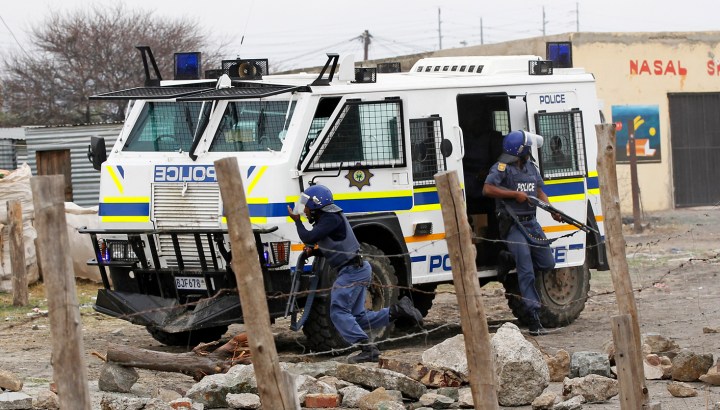South Africa
Marikana Commission: Bishop Seoka blames police, unions and Lonmin

Bishop Jo Seoka took a leading role in ending the Marikana strike, but he was also there on the day of the shootings. He testified to the Marikana Commission of Inquiry on Wednesday, laying the blame squarely at the feet of the SAPS, unions and Lonmin. By GREG NICOLSON.
14 August – Bishop Jo Seoka sat at the front of a conference room in Braamfontein, Johannesburg, and led the audience through the latest Benchmarks Foundation report. He was describing the social, economic and environmental impact of companies in the Rustenburg platinum belt. The report condemned the number of fatal accidents at Lonmin and the living conditions of workers. It found children chronically ill from sewerage spills in the area and questioned its corporate social responsibility initiatives. It found incidences of crime, rape, prostitution, social disintegration and communicable diseases in the squatter camps around Lonmin.
16 August – In his role with the SA Council of Churches, Seoka visited the Marikana site at Lonmin’s North West operations, where 10 people had been killed in the mineworker strike. To gain the trust of the workers he showed their leaders his driver’s licence and offered his cellphone number. The workers wanted food and water. He recognised there was a risk of violence and wanted to help reach a resolution.
The bishop testified at the Marikana Commission of Inquiry in Rustenburg Wednesday about his experiences the day police killed 34 people and wounded 78 others. The blame, he said, lies with Lonmin, the SA Police Service and the unions.
It was Seoka who took a leading role when Lonmin finally negotiated pay increases between 11% and 22%, but his character has since been questioned. With unions and the ANC suffering from a legitimacy crisis, the situation begged for a leader. After the church leaders stepped up, articles on Seoka’s history started doing the rounds. In May this year his St Alban Martyr Cathedral was interrupted as he was taken to court for assaulting a junior priest who allegedly leaked church documents. The articles naturally provided history on a newly prominent figure. Their circulation showed the bitterness that developed in structures of the tripartite alliance when they were sidelined.
But on Thursday it was Seoka’s turn to talk. He disagreed with the SAPS stance that because some workers used an inyanga and muti they were fixated on violence. His testimony also confirmed SAPS footage that the protestors refused to negotiate with anyone but Lonmin.
Seoka said the disaster could have been averted if management and the SAPS were willing to compromise. At some point after North West Police Commissioner Zukiswa Mbombo announced to the media that the situation in Marikana must end that day, she met with Seoka. He described her as “very anxious”. Mbombo gave him the freedom to negotiate a wage deal, but the bishop slammed her resolve to disperse and disarm the miners on 16 August. “Security is not negotiable,” she allegedly said to him. It was a “disrespectful” response to the SA Council of Churches’ attempts to resolve the issue, he said.
Attempts to engage Lonmin were just as fruitless. By this time, 10 people, including two police officers, had been killed but Lonmin had yet to meet representatives of the workers. The National Union of Mineworkers had no control over the workers, while the more militant Association of Mineworkers and Construction Union, while better received, seemed just as powerless. Seoka said Lonmin representatives told him they wouldn’t meet with the criminal and murderous workers.
He described a situation where imminent violence was palpable. A police chaplain told him that paramedics, social workers and religious leaders must “be ready”, he said. He wanted to report back to the workers, but after his meetings with Lonmin and Mbombo he was told by police that the koppie had become a security area that he couldn’t access. When Seoka left Marikana he received a call from the workers. There were gunshots in the background. “Bishop, where are you? We are being killed by the police,” heard Seoka.
Police Lieutenant-Colonel Duncan Smith had presented evidence of the mineworkers using muti and acting hostile to the police. His final revelation on Wednesday was that wounded protesters were handcuffed with cable ties to ensure the safety of paramedics.
Both the handcuffing of injured protestors and muti claims will be disputed. Seoka was to focus on the argument that traditional practices meant workers were on a collision course with the police. “Allegations that muti was protecting workers against bullets – it’s stupid, it’s nonsense, you’re making black people stupid,” he said. “Most of the workers here are young people and they have been through school, they should know better, that muti doesn’t protect them against bullets.”
That was a repudiation of the SAPS argument, but Seoka went further. When he was questioned as to why his claims differed with those from the police he said, “Police in this country – there is enough to say about how they’ve tried to plant things on people, change statements. I don’t trust a police person.
“Police in this country can never be trusted.”
Seoka’s comments put into question the determination of police to end the strike on 16 August and ask whether Lonmin is culpable because it refused to engage the workers in negotiations. They will increase the pressure on Mbombo, who is expected to be asked why she was so determined to end the strikes on that day and whether she was acting under instruction from others when she appears before the commission.
The commission resumes on Thursday. DM
Photo: Police arrive to disperse miners at Lonmin’s Marikana mine in South Africa’s North West Province September 15, 2012. REUTERS/Siphiwe Sibeko


















 Become an Insider
Become an Insider